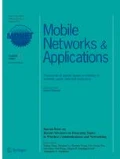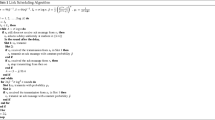Abstract
The max-min fair scheduling problem in wireless ad-hoc networks is a non-convex optimization problem. A general framework is presented for this optimization problem and analyzed to obtain a dual problem, which involves solving a series of optimization sub-problems. In the limit of infinite bandwidth (\(W\rightarrow\infty\)), the scheduling solution reduces to simultaneous transmission (spread spectrum) on all links (Negi and Rajeswaran, INFOCOM '04 (March 2004)). This motivates the analysis of the scheduling problem in the Ultra Wide Band (UWB) regime (\(W \gg 1\), but finite), a model for certain practical radios. A quadratic (in 1/W) lower bound to the single link capacity function is developed, which simplifies the dual sub-problem to a quadratic optimization (Negi and Rajeswaran, GLOBECOM '04, (Dec. 2004)). The solution to this sub-problem is then obtained under both total power and power spectral density constraints. This solution is utilized to iteratively construct the schedule (sub-band sizes) and power allocation, thus optimally solving the UWB max-min fair scheduling problem, to within any desired precision. Simulations on medium sized networks demonstrate the excellent performance of this scheme. A cellular architecture (not necessarily UWB) may also be considered in this framework. It is proved that Frequency Division Multiple Access is the optimal scheduling for a multi-band cellular architecture.
Similar content being viewed by others
References
N. Bambos, S. Chen and G. Pottie, Radio link admission algorithms for wireless networks with power control and active link quality protection, in: Proc. IEEE Infocom 1996 (March 1996).
D. Bertsekas and R. Gallager, Data Networks (Prentice Hall, 1992).
J.A. Bondy and U. Murthy, Graph Theory with Appl. (Elsevier, 1976).
T. Cover and J. Thomas, Elements of Inform. Theory (John Wiley, 1991).
3GPP2 C.S0002-D, Physical layer standard for cdma2000 spread spectrum systems, rel. D, (March 2004).
D. Goodman and N. Mandayam, Power control for wireless data, in: IEEE Personal Communications (April 2000) pp. 48–54.
X.L. Huang and B. Bensaou, On max-min fairness and scheduling in wireless ad-hoc networks: analytical framework and implementation, in: Proc. 2nd MobiHOC (2001) pp. 221–231.
IEEE 802.15 WPAN High Rate Alternative PHY Task Group 3a, accessible at http://grouper.ieee.org/groups/802/15/pub/TG3a.html
K. Jansen and L. Porkolab, On preemptive resource constrained scheduling: Polynomial-time approximation schemes, in: Proc.Integer Prog. Comb. Optim., 9th IPCO Conference (May 2002) pp. 329–349.
I. Katzela and M. Naghshineh, Channel assignment schemes for cellular mobile telecommunication systems: A comprehensive survey, in: IEEE Personal Communications (June 1996) pp. 10–31.
H. Luo, S. Lu and V. Bharghavan, A new model for packet scheduling in multihop wireless networks, in: ACM MobiCom 2000 (Aug. 2000).
S. Nash and A. Sofer, Linear and Nonlinear Prog. (McGraw, 1996).
R. Negi and A. Rajeswaran, Capacity of power constrained ad-hoc networks, in: INFOCOM '04 (March 2004).
R. Negi and A. Rajeswaran, Physical layer effect on MAC performance in wireless ad hoc networks, in: Proc. IASTED Conf.CIIT '03 (July 2003).
R. Negi and A. Rajeswaran, Scheduling and power adaption for networks in the ultra wide band regime, in: GLOBECOM '04 (Dec. 2004).
J.G. Proakis, Digital Communications 3rd Edition, (McGraw-Hill, 1995).
B. Radunovic and J.L. Boudec, Optimal power control,scheduling and routing in UWB networks, in: Proc. IEEE JSAC (Dec. 2004).
S. Verdu, Spectral efficiency in the wideband regime, IEEE Trans. Info. Theory 48(6) (2002) 1319–1343.
J. Zander, Performance of optimum transmitter power control in cellular radio systems, IEEE Trans. Veh. Technol. VT-41 (1992) 57–62.
Author information
Authors and Affiliations
Corresponding author
Additional information
This work was supported in part by the National Science Foundation under Career award 0347455.
Arjunan Rajeswaran received his Masters degree in Electrical and Computer Engineering from Carnegie Mellon University in 2003. Since August 2003, he has been pursuing his doctoral research at Carnegie Mellon. His reserach interests lie in the area of wireless networks. His focus is in the application of information and communication theoretic tools towards wireless network design. Several IEEE publications reflect his curent research on Medium Access Control design and performance. Arjunan received the best student paper award at IEEE/ACM Broadnets 2004.
Gyouhwan Kim received his B.S. and M.S. degree in Electronic Engineering from Sogang University in Korea, in 1994 and 1996, respectively. Since 1996, he has been working in the CDMA cellular system development team in Samsung Electronics. Currently, he is also working toward the Ph.D degree in the Department of Electrical and Computer Engineering at Carnegie Mellon University. His main research interests are in wireless networks and communication theory.
Rohit Negi received the B.Tech. degree in Electrical Engineering from the Indian Institute of Technology, Bombay, India in 1995. He received the M.S. and Ph.D. degrees from Stanford University, CA, USA, in 1996 and 2000 respectively, both in Electrical Engineering. He has received the President of India Gold medal in 1995. Since 2000, he has been with the Electrical and Computer Engineering department at Carnegie Mellon University, Pittsburgh, PA, USA, where he is an Assistant Professor. His research interests include signal processing, coding for communications systems, information theory, networking, cross-layer optimization and sensor networks.
Rights and permissions
About this article
Cite this article
Rajeswaran, A., Kim, G. & Negi, R. A Scheduling Framework for UWB & Cellular Networks. Mobile Netw Appl 11, 9–20 (2006). https://doi.org/10.1007/s11036-005-4457-1
Published:
Issue Date:
DOI: https://doi.org/10.1007/s11036-005-4457-1




